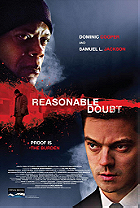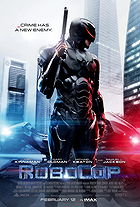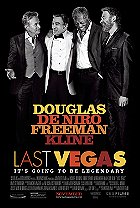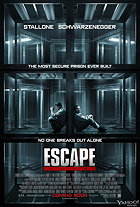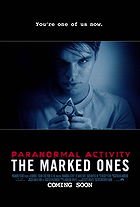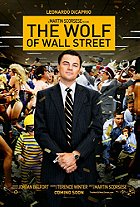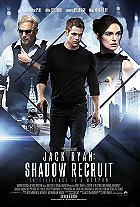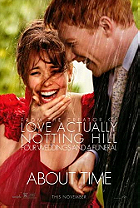The last Uwe Boll-directed motion picture I viewed was 2008's Far Cry, one of the filmmaker's trademark videogame adaptations, and I almost lost the will to live. Yet, Boll is still churning out flick after flick, and now we have 2013's Assault on Wall Street, an attempt by the German shit-purveyor to create a "mature" Taxi Driver-esque thriller. Tackling the 2008 Financial Crisis armed with outspoken (if not exactly groundbreaking) views about America's economy and Wall Street in general, Assault had plenty of potential, but it's squandered in the hands of the infamous ToiletBoll, who shows once again that he should never be trusted to write his own screenplays - or direct ANYTHING.

A blue-collar worker with a military background, Jim (Dominic Purcell) is in serious financial trouble, struggling to both pay his mounting bills and fund the cancer treatment for his wife Rosie (Erin Karplunk). Jim's life savings are sunk into investments, but the market suddenly crashes and his money disappears, leaving the broken man to battle off bankruptcy as other outside forces keep draining his funds and demanding more money. Despite hiring a shifty attorney (Eric Roberts), the situation only worsens, and Jim subsequently loses his job. Tragedy eventually strikes, prompting the angry, alone Jim to amass a stockpile of firearms and go after the Wall Street workers responsible for losing his money.
It should come as no surprise, but Boll's script is completely one-dimensional. Jim is depicted as a hard-working Everyman with no flaws - a stereotypical hero buried in debt with a sweet, dying wife. It's surprising that Boll didn't also throw in a dementia-ridden mother or a three-legged dog, just to hammer home the message that Jim is a solid guy who's been dealt a rough hand and deserves to exact revenge. Meanwhile, in Boll's mind, anyone who wears a suit and tie is a greedy scumbag who deserves to be killed. There's no moral middle ground here, with Boll painting the story in broad strokes of black and white, afraid to present a thoughtful treatise on who to blame in this situation. It's boiled down to a very simplistic equation of a man with a gun, and it doesn't help that Boll's research for the 2008 Financial Crisis probably amounted to reading the cliff-notes on Wikipedia.

Although Boll's cinematic technique has improved in terms of surface details, he's still the same old clueless moron when it comes to storytelling. Assault on Wall Street is simply boring as hell, with Boll perpetually insisting on a depressing, sombre tone in an attempt to seem "mature." Problem is, he lacks the style to execute this material properly. The film is a descent into the worst kind of uncomfortable gloominess, and there's no compelling reason to watch this malarkey unfold on-screen. Boll inserts some ideas into the script, but it's text rather than subtext; characters spell out the "big ideas" in dialogue, but the movie doesn't do doing anything with them. Instead, Boll uses this stuff as background details for a B-grade actioner.
Indeed, the movie eventually culminates with Jim waging war against Wall Street. He establishes himself as a hypocrite early into the massacre by letting a young bloke escape because of the clichéd "I have a pregnant wife!" line, before gunning down an entire floor of stockbrokers, with female receptionists also caught in the grenade blasts. It's a wish-fulfilment fantasy, but it's impossible to have fun with any of this shit - we're meant to just accept that these guys deserve their fates simply due to the jobs that they hold. One can maybe understand if Jim murdered a handful of players who personally screwed him, but such over-the-top theatrics are ghastly. Boll also fails to grasp concepts like tact and flair. It's glum enough to see workers getting shot, but Boll crosses a line by showing the aftermath of one killing, dwelling on the image of the man's brains splattered all over the pavement. It's just not necessary, coming off as exploitative when Boll wants to call himself sophisticated. The message about empowerment and revenge is completely wrong-headed.

And let's not get too far into the sheer idiocy of the flick, with Boll refusing to back anything with so much as a semblance of logic. For instance, Jim plans every step of his quest for vengeance in a hotel room, with maps, notes and images of targets plastered on the walls. Apparently the hotel's maid never saw any of it while cleaning his room on a daily basis. By the same token, some of his murders occur in broad daylight, and, at one stage, in an underground parking station which would almost certainly have a security camera or two. But he's never caught, and the police apparently have no leads. Plus, without giving too much away, Jim manages to frame another man for his crimes, despite witnesses and security cameras being able to verify that this man was in his office during the climactic massacre. Oh well, we are dealing with the same filmmaker who created a comedy out of 9/11, and who beat up film critics in a boxing ring under false pretences.
Boll never fails to assemble an impressive cast, but once again he squanders just about everyone. To his credit, Boll at least makes good use of Purcell here, playing to the hulking actor's strengths and prying some emotion out of the performer. Purcell is a naturally talented actor, so it's a shame to see him wasting his time on this bollocks. The rest of the actors make little impact, with Edward Furlong (yes, John Connor from Terminator 2) doing nothing to stretch his range, while Keith David is left to founder in a thankless supporting role. Eric Roberts also shows up as Jim's lawyer, but it's just weird to see him behind a desk wearing glasses.

Assault on Wall Street is not intelligent or mature enough to emerge as genuinely good, nor is it fun or tongue-in-cheek enough to be taken as an entertaining beer-and-steak movie. Rather, it's completely dull viewing which attempts to sample from both columns to disastrous effect. Hell, it even closes with Jim walking away scot-free after the massacre, proclaiming that he's "still out there" and will kill again. It further verifies that Boll has absolutely no interest in proper social commentary - he was just using this material as a buttress in order for him to produce a moronic action movie and try to call it smart. And with these closing moments in mind, Boll is clearly thinking about a franchise. Mr. Boll, there's a reason why Taxi Driver 2 never happened...
3.8/10
 Login
Login
 Home
Home 183 Lists
183 Lists 1662 Reviews
1662 Reviews Collections
Collections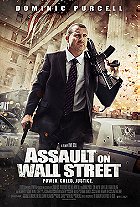
 0 comments,
0 comments, 